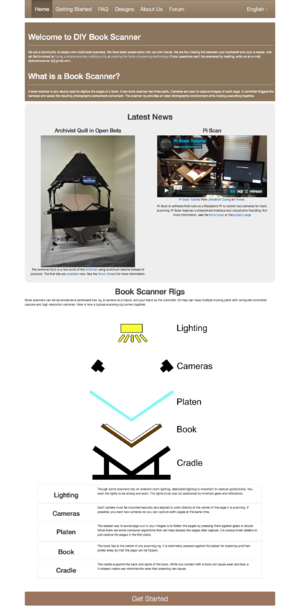Difference between revisions of "DIY Book Scanner"
| Line 11: | Line 11: | ||
== <small>'''Description'''</small> == | == <small>'''Description'''</small> == | ||
| + | It is a project that provides free software to digitize texts, as well as digital scanners designs that anyone can build. The idea was developed by the artist and engineer Daniel Reetz, who had scanned most of the books he owned. After a water accident in his building, he lost 100% of his printed books, so he decided to develop the DIY Book Scanner, an open-source artifact in order to share it so that anyone can build it with materials that are easy to get, or order a kit on the web site with a cheaper price than the market. | ||
| − | + | The evolution of different DIY Book Scanner designs makes the process faster, and takes care of the original material in addition to easily converting it into any type of format for any type of reading device. The scanners contain their own light, platen, cradle, electronic components and of course a system that turns the pages. | |
| − | + | Copyright issues remain controversial in legal terms, as Reetz sees it copyright belongs to an era and a way of making books that is no longer compatible with the contemporary technological age. The DIY Book Scanner project tries to transform this situation, in addition to empowering users not to depend on companies that sell, rent or distribute cultural capital, limiting it to their interests and for profit. | |
| − | |||
| − | |||
== <small>'''Interview'''</small> == | == <small>'''Interview'''</small> == | ||
Revision as of 16:49, 16 May 2017
Contents
Self-portrait
We are a community of people who build book scanners. We have taken preservation into our own hands. We are the missing link between your bookshelf and your e-reader. Join us! Get involved by trying a simple scanner, building a kit, or pushing the limits of scanning technology. If your questions can't be answered by reading, write us an e-mail: diybookscanner [at] gmail.com.
A book scanner is any device used to digitize the pages of a book. Every book scanner has three parts. Cameras are used to capture images of each page. A controller triggers the cameras and saves the resulting photographs somewhere convenient. The scanner rig provides an ideal photographic environment while holding everything together.
http://www.diybookscanner.org/
Description
It is a project that provides free software to digitize texts, as well as digital scanners designs that anyone can build. The idea was developed by the artist and engineer Daniel Reetz, who had scanned most of the books he owned. After a water accident in his building, he lost 100% of his printed books, so he decided to develop the DIY Book Scanner, an open-source artifact in order to share it so that anyone can build it with materials that are easy to get, or order a kit on the web site with a cheaper price than the market.
The evolution of different DIY Book Scanner designs makes the process faster, and takes care of the original material in addition to easily converting it into any type of format for any type of reading device. The scanners contain their own light, platen, cradle, electronic components and of course a system that turns the pages.
Copyright issues remain controversial in legal terms, as Reetz sees it copyright belongs to an era and a way of making books that is no longer compatible with the contemporary technological age. The DIY Book Scanner project tries to transform this situation, in addition to empowering users not to depend on companies that sell, rent or distribute cultural capital, limiting it to their interests and for profit.
Interview
Evelin Heidel http://dpya.org/en/index.php/Evelin_Heidel
Links
URL: http://www.diybookscanner.org/
Wayback Machine: https://web.archive.org/web/*/http://www.diybookscanner.org/
